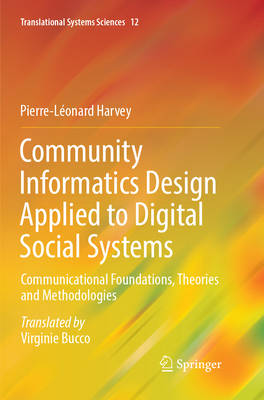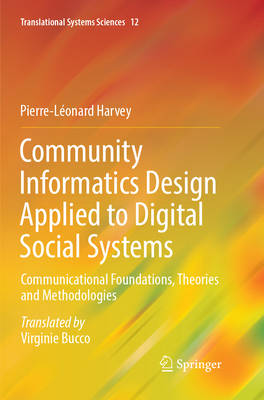
- Afhalen na 1 uur in een winkel met voorraad
- Gratis thuislevering in België vanaf € 30
- Ruim aanbod met 7 miljoen producten
- Afhalen na 1 uur in een winkel met voorraad
- Gratis thuislevering in België vanaf € 30
- Ruim aanbod met 7 miljoen producten
Zoeken
Community Informatics Design Applied to Digital Social Systems
Communicational Foundations, Theories and Methodologies
Pierre-Léonard Harvey
€ 105,45
+ 210 punten
Uitvoering
Omschrijving
This book introduces a Digital Social System Praxis Framework (DSSPF) integrating Computational Media, Evolutionary Systems Thinking and Design Thinking approaches to E-transformation practice, also called Community Informatics Design (CID). The DSSPF framework is intended to create communication spaces dedicated to knowledge production and sharing for social and organizational change. It allows social systems researchers and practitioners to recognize their synergistic roles in the praxis process to shape their future through social innovation projects. This transdisciplinary text provides potential students and practitioners fundamental concepts and tools for such design. It offers resources from the Pragmatic and Systemic philosophy of science for the co-construction of social architectures and infrastructures, and multi-aspectual design methodologies by which government, organizations and civil society can learn to ethically co-design common ground. This approach provides complementary and common patterns from known methods, models, and theories of social systems interventions that could support a generic framing of large scale sociotechnical systems: digital social innovation ecosystem, living Labs, Fab Labs, enterprise collaborative networks.
There will be a particular focus on understanding and addressing the dimensions that make people from different communities of practice able to communicate and collaborate through multiple digital media, design platforms, worldviews and modeling approaches.
There will be a particular focus on understanding and addressing the dimensions that make people from different communities of practice able to communicate and collaborate through multiple digital media, design platforms, worldviews and modeling approaches.
Specificaties
Betrokkenen
- Auteur(s):
- Uitgeverij:
Inhoud
- Aantal bladzijden:
- 459
- Taal:
- Engels
- Reeks:
- Reeksnummer:
- nr. 12
Eigenschappen
- Productcode (EAN):
- 9783319880105
- Verschijningsdatum:
- 5/09/2018
- Uitvoering:
- Paperback
- Formaat:
- Trade paperback (VS)
- Afmetingen:
- 155 mm x 235 mm
- Gewicht:
- 746 g

Alleen bij Standaard Boekhandel
+ 210 punten op je klantenkaart van Standaard Boekhandel
Beoordelingen
We publiceren alleen reviews die voldoen aan de voorwaarden voor reviews. Bekijk onze voorwaarden voor reviews.











